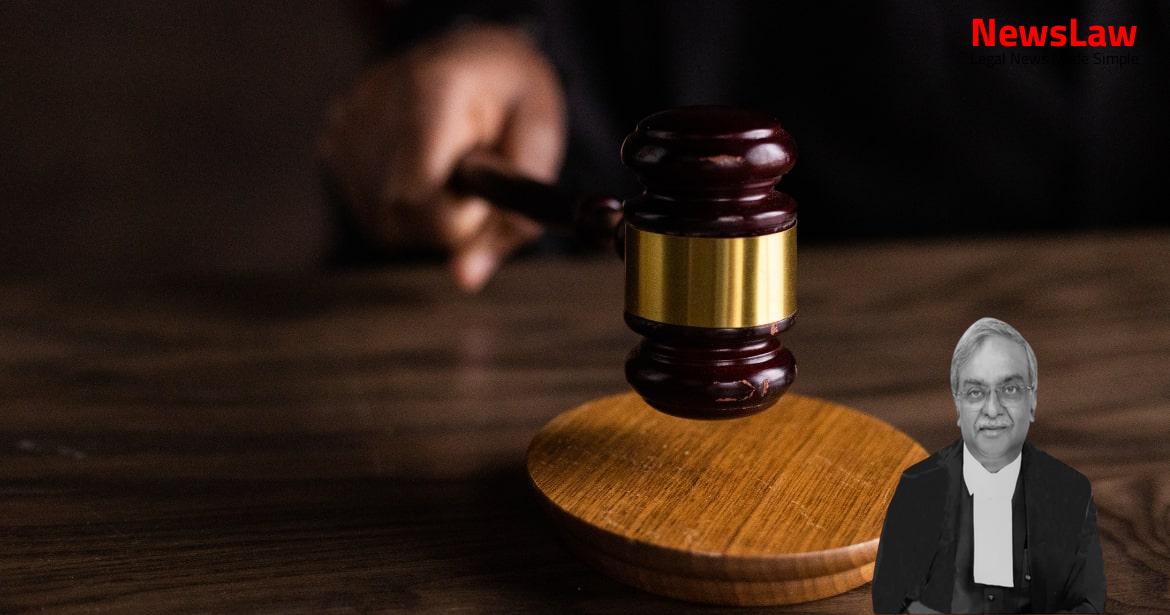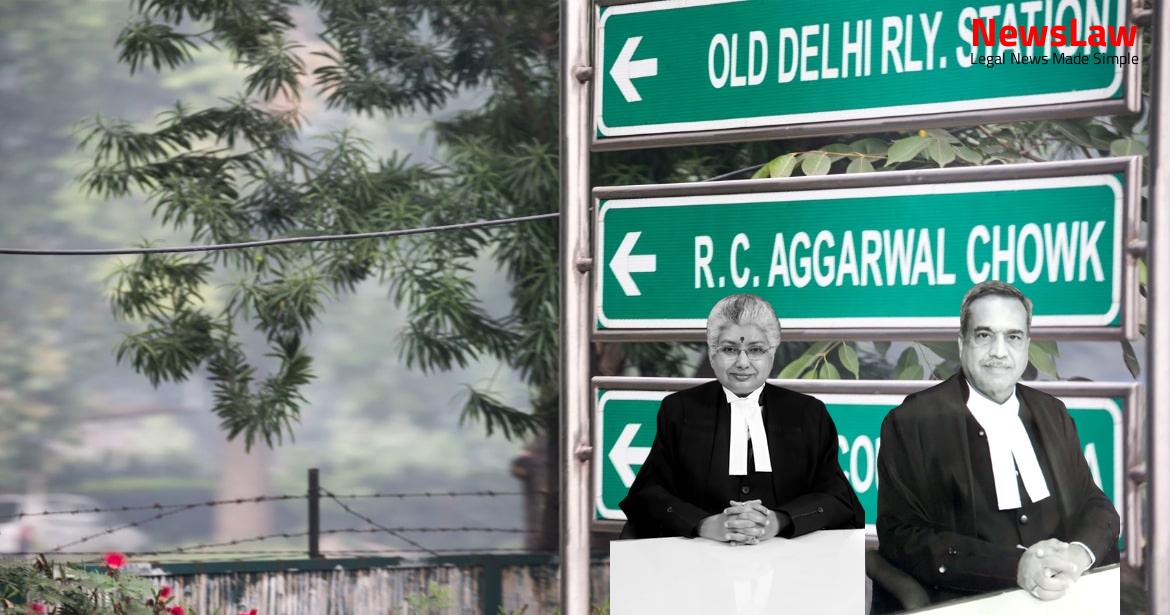The court’s detailed legal analysis regarding the rejection of a plaint in a legal dispute sheds light on the complexities of court jurisdiction and procedural amendments. This summary delves into the intricacies of the Orissa Amendment to Section 115 of the CPC and its impact on the rejection of pleas in a challenging court case. Stay tuned to unravel the legal intricacies governing court decisions in this insightful analysis.
Facts
- Defendant no.1 filed C.R.P. No.5 of 2012 under Section 115 of the CPC.
- Defendant no.1 tried to blackmail and threaten the plaintiff through its Managing Director.
- Defendant no.1 lodged false complaints against the plaintiff regarding iron ore theft and license violations.
- Paradeep Port Trust Authority cancelled the plaintiff’s license based on the complaints by defendant no.1.
- Defendant no.1 pressured the plaintiff to supply iron ore or face cheque encashment.
- Plaintiff issued stop payment on the cheque, leading to dishonor.
- Defendant no.1 initiated legal action under Section 138 of the N.I. Act.
- Plaintiff filed a suit seeking declaration regarding the cheque and non-liability towards defendant no.1.
- Defendant no.2 and defendant no.1 colluded for illegal gains.
- The trial court dismissed defendant no.1’s application to reject the plaint.
- The revisional court reconsidered and allowed the application, disposing of the suit.
- Plaintiff filed a suit against defendants seeking various declarations and relief.
- Various agreements and correspondences took place between the parties regarding the cheque, iron ore supply, and license cancellation.
- Final orders were passed by the court leading to the appeal by defendant no.1.
- Revisional court allowed the revision petition and rejected the plaint.
- Plaintiff filed W.P.(C) No.7059 of 2013 before the High Court.
- High Court set aside the revisional court’s order and remanded the matter for fresh consideration.
- High Court held that the revisional court had exceeded its jurisdiction in rejecting the plaint.
Also Read: Analysis of Tax Exemption for Enemy Properties
Arguments
- The appellant filed an application under Order VII Rule 11 of the CPC seeking rejection of the plaint in the suit filed by the respondent.
- The application was based on the grounds that the prayers sought in the suit were not grantable, the suit was not maintainable, and was barred under Section 41 of the SR Act.
- The trial court dismissed the application without appreciating the reasons behind it.
- The High Court did not consider the Orissa amendment and misunderstood the application of Section 115 of the CPC in relation to the revisional court’s powers.
- The High Court set aside the revisional court’s order rejecting the plaint and remanded the matter for fresh consideration, which the appellant’s counsel argued was incorrect.
- The appellant’s counsel contended that the High Court’s order contradicted the Orissa amendment of Section 115 of the CPC and urged for the restoration of the revisional authority’s order.
- It was argued that the respondent/plaintiff could not have filed a writ petition against the revisional court’s order rejecting the plaint.
- The High Court held that the revisional court exceeded its jurisdiction by rejecting the plaint instead of remanding it to the trial court.
- Reference was made to Section 115 of the CPC [via Orissa Act 26 of 1991] to support the argument that the revisional court acted within its power in rejecting the plaint when the trial court failed to do so.
- The rejection of the plaint by the revisional court was seen as a final disposal of the suit as per the second proviso to Section 115 of the CPC.
- The plaintiff sought a declaration regarding a cheque issued as security to defendant no.1.
- The rejection of the plaint was based on three reasons, namely being barred under the SR Act, being frivolous, and being undervalued.
- The High Court set aside the rejection order and remanded the matter to the revisional court for reconsideration.
- The application for rejection of the plaint was primarily due to the lack of consequential reliefs being sought by the plaintiff.
- Section 34 of the SR Act was cited regarding the discretion of the court in granting declarations without further reliefs.
- Omission of further relief prayers by the plaintiff is relevant only at the final adjudication stage.
- The plaintiff cannot be rejected solely for seeking declaratory reliefs without additional consequential reliefs.
Analysis
- Rejection of a plaint is considered a decree within CPC.
- High Court’s decision on remanding the matter to the revisional court was deemed unjustified.
- Orissa amendment to Section 115 of CPC allows for rejection of plaints by revisional courts.
- Availability of writ petition under Article 227 as a remedy in such cases.
- Second proviso to Section 115 of CPC (Orissa amendment) allows for rejecting a plaint as a part of revisional court’s powers.
- The High Court erred in setting aside the rejection of the plaint.
- The plaintiff’s reliefs sought in the suit were found to be barred by law.
- Application under Order VII Rule 11 of CPC was justified in rejecting the plaint.
- The High Court’s interference was found to be unwarranted, and the revisional court’s order was restored.
- The plaint in C.S. No. 1065 of 2009 was ultimately rejected.
- Defendant no.1’s objections and argument against the plaintiff’s suit were considered valid regarding the declaratory reliefs sought.
- The High Court was erroneous in deciding the revisional court’s jurisdiction in rejecting the plaint.
- The Orissa Amendment to Section 115 of the CPC grants revisional powers not only to the High Court but also to the District Court in certain cases.
- The District Court has the power to call for the record of any case decided by a subordinate court if it appears that the subordinate court exceeded its jurisdiction, failed to exercise its jurisdiction, or acted illegally or with material irregularity.
- The High Court or District Court, as the case may be, may make such order in the case as it deems fit in such circumstances.
- The High Court or District Court cannot vary or reverse any order against which an appeal lies.
- The High Court has sole competence to make orders in cases arising from original suits or proceedings exceeding a certain valuation.
- The High Court or District Court cannot vary or reverse any order, except in specific circumstances where it would finally dispose of the suit, prevent a failure of justice, or cause irreparable injury.
- The Orissa Amendment of the CPC also includes provisions related to the dishonour of cheques under Section 138 of the N.I. Act.
- There is a rebuttable presumption that negotiable instruments, including cheques, are made or drawn for consideration.
- In the instant case, the plaintiff’s actions in seeking a declaration regarding the cheque issued are seen as attempts to frustrate proceedings under Section 138 of the N.I. Act.
- The Orissa Amendment of 2010 made changes to Section 115 of the CPC, aligning it with the Orissa Amendment of 1991 with specific reference to cases arising out of original suits or proceedings.
- Errors of fact or law are not covered by the terms ‘illegally’ or ‘with material irregularity’ in this clause, but rather refer to the manner in which decisions are reached.
- The exercise of jurisdiction by the revisional court in this case is in accordance with the second proviso to Section 115 of CPC (Orissa amendment).
- Various judicial decisions have established that while exercising jurisdiction under Section 115, courts cannot correct errors of fact or law unless they are related to the jurisdiction of the court to try the dispute itself.
- The purpose of Order VII Rule 11 CPC is to determine whether a plaint discloses a cause of action, and if not, the court may reject it at the threshold.
- The power under Section 115 CPC is limited to correcting jurisdictional errors only, not errors of fact or law.
- The intent of Section 41(b) of SRA is to prevent injunctions from restraining criminal proceedings, as highlighted in various judgments.
- Revision petitions under Section 115 CPC are not maintainable against interlocutory orders.
- The court must strictly adhere to the conditions enumerated in Order VII Rule 11 of CPC when considering rejection of a plaint.
- A suit to restrain criminal proceedings from being initiated is not maintainable.
- The courts have a duty to ensure that baseless and meritless litigation is nipped in the bud at the earliest stage.
Also Read: SC Clarifies: Choice of Depreciation Method Allowed Until Return Filing
Case Title: M/S. FROST INTERNATIONAL LTD. Vs. M/S. MILAN DEVELOPERS AND BUILDERS (P) LTD. (2022 INSC 380)
Case Number: C.A. No.-001689-001689 / 2022



